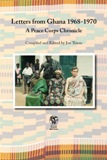Talking to Jon Thiem (Ghana 1968-70) Author of Letters from Ghana 1968-1970
Dr. Jon Thiem has lived in Colorado for the last 35 years. He is professor emeritus of English and
Comparative Literature at Colorado State University. It was through his Peace Corps service that he discovered his vocation as a teacher, translator, and scholar of literature. His numerous publications include Lorenzo de’ Medici: Selected Poems and Prose (1991) and Rabbit Creek Country: Three Ranching Lives in the Heart of the Mountain West (2008), written in collaboration with his colleague Deborah Dimon. Rabbit Creek Country was a Finalist for the Colorado Book Award in 2009.

Dr. Jon Thiem
Several years back he mentioned to a young woman (with a Ph.D.) that in the late 1960s he had served with the Peace Corps in Ghana, West Africa. She thought he was referring to a United Nations Peace Keeping operation! The incident inspired him to compile this collection of letters. The body of letters are from August 1968 to June 1970. Thiem was stationed in a village in the rain forest of southern Ghana. He taught English literature at the district secondary school. Every two weeks or so, he sent letters and audio tapes to the States, describing his day-to-day impressions of Ghana-the miseries and splendors of life in the tropics.
These texts are not memoirs informed by hindsight, but naive testimonies, fresh and ignorant of the future, filled with astonishment. Thiem’s SDS background gives this collection a lot of political content, which takes in U.S. Vietnam policy, dramatic government changes in Ghana, school politics, village power struggles, and controversies about Peace Corps’ mission. The letters not only give fascinating pictures of the United States as seen through Ghanaian eyes (in an era of limited access to world news), but also show how U.S. volunteers in Ghana struggle to grasp the eruptions of civil conflict and violence at home.
I interviewed by emails Jon recently about his new book, Letters from Ghana 1968–1970: A Peace Corps Chronicle, published by Peace Corps Writers.
•
Jon, congratulations on your book. It is a real achievement pulling it all together. I was hoping to ask a few questions so readers will get an understand on what the book is about, what you are about.
Happy to answer. Ask away.
First off. Where are you from in the United States? What college did you attend and what was your major?
I grew up in southern Delaware, farming country, not far from the Atlantic Ocean. I got a BA from Dickinson College (PA) in Political Science, with a focus on International Relations. For one of my courses I wrote a seminar paper on modernization in Ghana and that was a reason I asked PC to send me there.
Why did you join the Peace Corps in the first place?
I decided to become a Peace Corps English teacher in Ghana for three reasons. First, Peace Corps service offered an alternative to participation in the U.S. military campaign in Vietnam, which I opposed on moral and pragmatic grounds. Secondly, I wanted to live in West Africa and observe firsthand the people and customs. I wanted to explore a different way of life. And finally, I hoped as an English teacher to assist in the economic and social development of Ghana.
What was your site like?
The village of Acherensua is in the Brong-Ahafo region, which Ghanaians themselves regarded as being off the beaten path. It is in southern Ghana, in the rain forest-a lush environment, with a climate of two seasons, one marked by heavy tropical rains and the other by the dry harmattan wind blowing dust out of the Sahara. The village was a 3-4 hour lorry trip from Kumasi.
When you finished your tour, what did you do?
After leaving Ghana, I took up graduate study at Indiana University, where I got a doctorate in Comparative Literature. I began an academic career and taught literature at Colorado State until my retirement in 2007.
Tell us about the book, what is it?
The book, Letters from Ghana 1968-1970, is a collection of letters, texts, and audio tape transcriptions composed by me and other people. It includes a substantial introduction and commentaries on the texts. The collection is designed not only to give readers a sense of how things were in the late 60s in rural Ghana, but also to put the time period into a political and historical context.
I have enjoyed reading a number of PC letter collections from different African countries. (I mention several Ghana collections in my preface, and not just by PCVs.) Often, I found myself wanting more from these admirable collections than they gave. I wanted to know if parts of the letters were left out (the editing is usually pretty casual). I wanted to read some letters from people the PCVs were writing to and learn of their reactions. I wanted to read some letters by host country nationals.
So my book differs from most other Peace Corps letter collections by putting in features that I myself looked for as a reader but did not find.
For one thing, I include not just my own letters but also some of other Peace Corps volunteers, and some from my stateside correspondents. My volume also catches the voices of Ghanaian nationals-teachers, students, politicians, and villagers. Their voices are “heard” in letters and in transcribed audio tapes. So the collection is really multivocal.
In addition to the ‘mulltivocal’ what makes, in your opinion, this collection of letters so special?
The letters are edited in such a way that they will be useful to (future) historians. I did this because of my belief that the body of letters that resulted from the great Peace Corps diaspora is a rich (though neglected) legacy that deserves serious study.
Finally, the book tracks the friendship that developed between me and my Ghanaian colleague Ohene Owoahene. At one point we began collecting and translating Asante court poetry. The Asante are Akans, the largest ethnic group in Ghana. It was a great privilege to gain access to this fascinating oral tradition. The project was a pretty unusual one for a volunteer. Peace Corps Accra was enthusiastic about it, and wanted me to do it full time, but I felt an obligation to continue teaching my fifth form students.
The Ghanaians who helped us were pleased that a white man admired their tradition and was coming not just to preach to them but also to learn from them. They felt they had something of their own to give. This court poetry was quite distinctive, not at all modern or western. And much of this tradition was in danger of being lost.
Ohene and I eventually published our versions of Asante court poems in the U.S. journal Translation (Winter, 1978-79).
What Peace Corps books have you read that you think as a scholar do a good job of preserving the “rich (though neglected) legacy” that should have further academic study?
There are two letter collections out of Africa that I found quite absorbing. The first is John S. Jochum’s Letters from Zaire (WinePress Publishing, 2005). Jochum was a PCV (1975-1979) who built fish farms to raise tilapia. The second is Mary Rugh’s Report from Molly (1964). She was a PC teacher in Cape Coast , Ghana. Her “reports” are witty and informative. Two memoirs I liked were from PCVs in countries neighboring Ghana. Sarah Erdman, who was a volunteer engaged in medical support in Ivory Coast (1998-2000), wrote Nine Hills to Nambonkaha (Henry Holt, 2003). George Packer was a teacher in Togo. His Village in Waiting came out with Vintage Books in 1989. These last two examples show that memoirs are more likely than letter collections to get published by the bigger presses.
Looking back over your career, how would you say the Peace Corps changed or enhanced your life and teaching career?
It was through the Peace Corps that I discovered my vocation as a teacher, translator, and scholar of literature, as the book makes clear. Also, at Colorado State University, I routinely incorporated West African literature, mythology, and the Asante court poetry in the international literature classes I taught. A second influence was my long-standing friendship with Ohene. It carried on via snail mail until his death in 2008. Forty years.
Have you been back to Ghana or been connected in anyway with the work RPCVs have done in-country since their tours?
No.
What are you doing now?
I spend a lot of time writing, reading and traveling, and I like to go hiking and skiing here in the Colorado Rockies.
RPCV writers find it difficult to promote their books, whether they are fiction or not. How are you going about selling the letters?
Mainly online, especially through Peace Corps Worldwide. I’ll also be using the services of Wise Penny Marketing whose director, Natalie Bolton, has experience in online book commerce. We will make a website for the book. Notices will be sent to alumni magazines, African studies journals, and libraries with strong African collections, etc. I plan to send a copy of the book to Acherensua Secondary School, where so many of the letters were written. It will doubtless cause a stir. My hopes that the letters will “sell” are higher than my expectations.
Thank you, Doctor, for your time and for your book.
It has been my pleasure.
No comments yet.
Add your comment